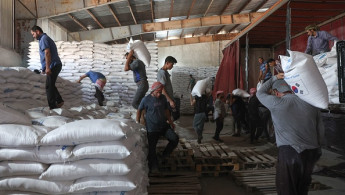Russia vetoes renewal of Syria aid deal, effectively 'killing' UN humanitarian operations into rebel-held northwest Syria
Russia on Tuesday vetoed at the U.N. Security Council a nine-month renewal of an aid operation delivering assistance to some 4 million people in rebel-held northwest Syria from Turkey and then failed in its own bid to instead extend it for six months.
The Security Council authorisation for operation, which has been delivering aid including food, medicine and shelter since 2014, expired on Monday. U.N. Secretary-General Antonio Guterres had wanted a 12-month renewal.
Russia U.N. Ambassador Vassily Nebenzia signaled that the aid operation could not be salvaged.
After casting the veto and before the council vote on Russia's proposal, he told the body: "If our draft is not supported, then we can just go ahead and close down the cross-border mechanism. ... The technical rollover for any period of time we're not going to accept."
China abstained on the vote for the nine-month compromise renewal drafted by Switzerland and Brazil, while the remaining 13 Security Council members voted in favor.
Only Russia and China voted in favor of Russia's proposal for a six-month extension. Ten Security Council members abstained and the United States, Britain and France voted against it.
'An act of utter cruelty'
To be adopted, a resolution needs at least nine votes in favor and no vetoes by Russia, China, the United States, France or Britain.
Authorization is needed because Syrian authorities did not agree to the U.N. aid operation. In both 2022 and 2020 the mandate for the operation ran out but was renewed a day later.
"It's a sad moment for the Syrian people," U.S. Ambassador to the United Nations Linda Thomas-Greenfield told the council after Russia's veto. "What we have just witnessed, what the world has just witnessed, was an act of utter cruelty". The Ambassador also likened Russia to "a bully in the playground".
"We must keep at this - the Syrian people are counting on us - and we must all urge Russia to come back to the table in good faith," she said.
Thomas-Greenfield after the second vote added that the United States would continue to work with all council members to renew the aid operation and urged Russia to reconsider its position.
#BREAKING‼️Russia vetoes UN vote to extend key Syria aid route by nine months ~ Here's U.S. Ambassador Thomas-Greenfield @USAmbUN @USUN on Russia Tuesday:
— Pamela Falk CBS News Correspondent United Nations (@PamelaFalk) July 11, 2023
"Like a bully in a playground"@CBSNews | UnitedNations https://t.co/9w5DijaJ3k pic.twitter.com/Qm0N5QsD9P
Defying 'reason and principle'
Russia argues that the U.N. aid operation violates Syria's sovereignty and territorial integrity. It says more aid should be delivered from inside the country, raising opposition fears that food and other aid would fall under government control.
The Security Council initially authorized aid deliveries in 2014 into opposition-held areas of Syria from Iraq, Jordan and two points in Turkey. But Russia and China have whittled that down to just one Turkish border point.
David Miliband, President and CEO of the International Recovery Group, a humanitarian NGO that has worked in Syria, condemned the Russian veto, saying it has shut down "a critical lifeline for millions of Syrians, with no viable alternative to meet the growing humanitarian needs in northwest Syria".
Miliband pointed out that Syria's northwest was still suffering from the effects of the massive Turkish-Syrian earthquake that struck the area in February, meaning the decision to cut off aid routes at such a critical time "defies reason and principle" and reminded members of the Security Council that they should be “guided by humanitarian imperatives rather than politics" to "ensure Syrians in need, wherever they are, can be reached through the most direct routes."
"After so many years of failure for the Syrian people, we call on the Security Council to urgently reconvene to re-authorize access through Bab al Hawa for a further 12 months," Miliband concluded.
A crackdown by Syrian President Bashar al-Assad on pro-democracy protesters in 2011 led to a civil war, with Moscow backing Assad and Washington supporting the opposition. Millions of people have fled Syria and millions more are internally displaced.
(Reuters)





 Follow the Middle East's top stories in English at The New Arab on Google News
Follow the Middle East's top stories in English at The New Arab on Google News


![MP Essam Diab's pursuit to block TikTok in Egypt has revived an already ongoing debate in the country. [Getty]](/sites/default/files/styles/image_330x185/public/1230748046.jpeg?h=a5f2f23a&itok=-8MqBLLC)